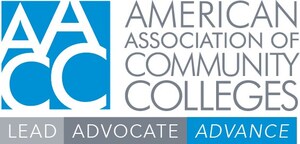Five Innovative Community Colleges Named Awards Of Excellence Winners
American Association of Community Colleges Honors Visionary Work of Community Colleges
NEW ORLEANS, April 25, 2017 /PRNewswire-USNewswire/ -- The nation's community colleges educate nearly half of all undergraduate students. As students' needs change, so do these institutions, always working to help students reach their educational and career goals. Five community colleges were honored for their work advancing the student success agenda on April 24 at the American Association of Community Colleges' (AACC) Awards of Excellence Gala, part of AACC's 97th Annual Convention in New Orleans, La.
Community colleges serve larger percentages of diverse student populations than any other sector of higher education. This year's winner in the Advancing Diversity category has been at the forefront of addressing the needs of minority students for more than a decade. Hillsborough Community College (HCC) in Florida, led by President Ken Atwater, serves as a preeminent national voice in addressing issues facing Black and Hispanic/Latino males through its Black, Brown, and College Bound National Summit. The summit draws more than a thousand higher education professionals, faculty, and students from more than 25 states. HCC also developed the HOPE Scholars program that was specifically designed to improve retention, graduation, and the four-year college transfer rate of African American and Hispanic males. HOPE Scholars benefit from faculty mentors, targeted workshops and seminars, tutorial services and tours of four-year colleges and universities. In the last four years, more than 85 percent of students enrolled as HOPE Scholars have graduated from HCC and transferred to four-year institutions.
Edie Carter of Amarillo College (Texas) won in the Faculty Innovation category. Carter leads the college's Developmental Math Team. She and her team produce positive and effective change in an environment where funding is tight and expectations are high. Carter led the redesign of the developmental math course sequence and the creation of new developmental math courses that prepare students for college-level course work. Under Carter's leadership since 2010, completion rates in developmental math courses have been on the rise and drop-out rates have declined. During the 2015-16 academic year, more than 75 percent of students in developmental math completed courses. She's also invested in supporting junior faculty. She implemented "Math Mania Mondays" mini-workshops for faculty, which feature topics such as test taking tips, proportions and graphic calculators. Amarillo College is led by President Russell Lowery-Hart.
Partnerships between community colleges and industry are vital to preparing a skilled workforce. Washington's Olympic College, led by President David Mitchell, was named the winner in the Outstanding Corporate/College Partnership category. Olympic College and the Puget Sound Naval Shipyard and Intermediate Maintenance Facility (PSNS and IMF) collaborated on three training programs that have raised the skill and education levels of the regional workforce, boosting the local economy. PSNS and IMF employ more than 12,000 civilian workers. About a quarter of their collective personnel are graduates of this program, which is one of the largest and most successful federal apprentice programs in the nation. Students are given a pathway to a degree in industrial trades and can earn a position as a skilled trade worker or shop supervisor at PSNS. The 2015-2016 enrollment for the program logged 811 apprentices in 24 different trades, and 1,354 entry-level employees enrolled in classes. There's also a training program for entry-level employees at the shipyard, and an after-hours program targeted at increasing employees' skills.
Halifax Community College (North Carolina) has demonstrated a firm commitment toward campus and community safety. The college, led by President Michael Elam, won in the College Safety and Planning category. The college conducts trainings, such as air ambulance demonstrations, weapons of mass destruction classes, and CPR and first aid training. A comprehensive college safety, emergency and prevention plan is widely accessible. Routine campus inspections and drills are conducted, and the college has implemented a campus-wide public announcement system, security cameras, electronic locks, back-up generators and emergency call boxes. Safety trainings also are available to the community.
The end goal of every new program or initiative at a community college is to help students succeed. The 2017 Student Success award went to Alabama's Wallace Community College–Dothan (WCCD), led by President Linda C. Young. The fasted growing community college in Alabama, WCCD serves a large percentage of first-generation, low-income and underprepared students. The college implemented the I-CAN (Improvement, Constant And Never Ending) instructional initiative to help close the socioeconomic achievement gap and increase completion rates. I-CAN is faculty-driven, and is aimed at creating a more active and engaging learning environment at WCCD. Strategies have included replacing the instructional model of lectures with detailed unit objectives and lecture videos, frequent assessments and early interventions, and faculty mentoring and professional development opportunities focused on student success. The result? A 27-percent increase in retention rates and a 67-percent increase in the number of associate degrees conferred in 2014-15. Data for 2015-16 show a 49-percent increase in the "150% time" graduation rate over the two previous years. Plans are in place to incorporate the I-CAN program throughout the entire Alabama Community College System.
Award winners were selected by a committee of the AACC Board of Directors. Eighteen finalist colleges also were recognized at the Awards of Excellence Gala.
As the voice of the nation's community colleges, the American Association of Community Colleges (AACC), delivers educational and economic opportunity for 12 million diverse students in search of the American Dream. Uniquely dedicated to access and success for all students, AACC's nearly 1,200 member colleges provide an on-ramp to degree attainment, skilled careers and family-supporting wages. Located in Washington, D.C., AACC advocates for these not-for-profit, public-serving institutions to ensure they have the resources and support they need to deliver on the mission of increasing economic mobility for all.
SOURCE American Association of Community Colleges
Related Links
WANT YOUR COMPANY'S NEWS FEATURED ON PRNEWSWIRE.COM?
Newsrooms &
Influencers
Digital Media
Outlets
Journalists
Opted In




Share this article